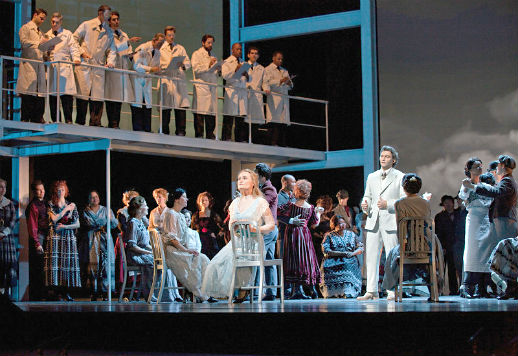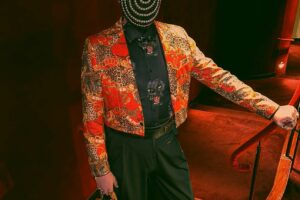

It was the nineteenth-century opera equivalent of the “tired businessman” show. Moreover, it was selected as the first opera to be performed at the Metropolitan Opera onOctober 22, 1883(that’s the “Old Met,” if you’re keeping score); and it became so endemic there that by 1897, the waggish critic William J. Henderson dubbed the Met “Das Faustspielhaus.” Although Faust has hardly fallen out of the repertoire altogether, its performances always feel more like revivals than the returns of a classic.
I must confess that I have always felt a deficiency of sympathy and even perhaps of interest in Faust—Marlowe’s or Goethe’s, it hardly matters. The Faust of legend and play is an old pedant who longs either for more knowledge or more experience, depending on your reading, who, it seems, takes an inordinately long time to notice that everyone else is having more fun.
Barbier and Carré carefully excised every trace of intellectual distinction from Goethe’s drama, and the result was perfectly suited to Gounod’s facile style. Their Faust is a cad without any curiosity beyond what is under the heroine’s skirts—he seems, after all that learning, to be the guy who, if he had it to do all over again, would definitely nail that hot chick in Accounting. Their Mephistopheles—who is supposed to be, if not perhaps the supreme Devil, a high-ranking member of the infernal cabinet, is hardly more than a card-shark, parlor magician, and pimp.
Marguerite must be considered seriously for the position of opera’s stupidest heroine, although she faces stern competition from Donizetti’s Lucia and Meyerbeer’s Dinorah (“Stupidity is the real key-note of Marguerite’s character”—this, from one of the role’s greatest exponents in the 19th century, Clara Louise Kellogg).
Let us not deny Gounod his skill, and his way with a melody—but the work is essentially an operetta in a sour mood, complete with idiot hero and ingenue, and a rake for comedy effect. Gounod learned a great deal from Weber and Meyerbeer and even Beethoven, and then made a molehill out of their mountains; at his best, he sounds like mid-period Verdi at his laziest.
You recognize, almost against your will, half-a-dozen tunes and themes that have entered the cultural memory, and have been quoted, distorted, and parodied so many times that we have forgotten that they were once worshipfully received as components of—yes—Queen Victoria’s favorite opera.
Des McAnuff’s controversial production, in this HD relay, relocates the opening action to c. 1945. During the overture, Faust (a not very much aged Jonas Kauffman) hobbles slowly through a crowd of grotesques, presumably victims of nuclear fallout. We are in a large scientific office/laboratory; Marina Poplavskaya turns up, silent, as a lab tech.– apparently that chick moved up from Accounting. Faust is a nuclear scientist, somewhere between von Braun and Oppenheimer, surrounded, early on, by the chorus in lab coats. Deep, huh?
McAnuff seems happily unaware that the A-Bomb is just as clichéd and superficial a gesture toward the discussion of evil as Nazism now—it’s just that nuclear warfare is “our” evil, while Nazism somehow remains the evil of the other.”
Speaking of evil, Rene Pape turns up as Mephisto in a fine white suit and Panama hat, looking a bit like George Raft. Rather than restoring Faust’s youth and whisking him off to a new place, this devil apparently moves him back in time, to something like World War I—the first of McAnuff’s decisions that defy sense. Surely, Faust regrets his lack of action, rather than his actions —how is bonking a village girl going to assuage genocidal guilt, exactly? At any rate, Marguerite’s village couldn’t be happier about global conflict; so happy are they that they launch a giant soldier puppet cavorting around the stage (I didn’t get it either).
Michelle Losier, whose lovely mezzo was somewhat lost in the unrewarding role of Siebel, was apparently dressed by the designer of Newsies. Marguerite is, in any production, the kind of girl who simultaneously doesn’t know how babies are made, and is totally impressed by diamonds (Bernstein’s Cunegonde, at least, knows what she is about; her cynicism and hypocrisy are part of her charm). I did not mind the French-bourgeois look of the villagers’ costumes, but drab 1915 made an odd match for the 1985-style water cooler that dominated center stage for much of the action, and was the location of Mephistopheles’ wine-making parlor trick. Where are we, Mr McAnuff? 1910, 1985, 1945, 1530?
For the bulk of the action, Faust proceeded business-as-usual; it is very hard to re-flavor the Gounod-Barbier-Carre religio-erotic treacle. McAnuff made a brave try, with the sudden appearance of a second giant puppet, this one representing the Ghost of Christmas Yet to Come, at the close of the fourth act—but the curtain spared us from dwelling on that absurdity. The ballet was cut down to a brief mime by those lab assistants shielding their eyes from, you guessed, a Los Alamos-style blast (deep, huh?).
The McAnuff frame returned in force at the end of the opera, and showed his confusion and discomfort. Marguerite’s soul is spared, but in this production clambered bodily up a large steel staircase at the back, while the chorus—back in the lab coats of the overture—assured us of her salvation. How the agents of the nuclear Faust’s destruction of the world—his lab assistants—can be understood as celestial voices, Heaven only knows. Methinks McAnuff faintly remembered that angels wear white too, and thought it would be cool if they could be equated with scientists. It might be cool, if it made any sense.
The action closed with Faust’s completion of the suicide he threatened in Act I—it was all, apparently, like St. Elsewhere, a dream. McAnuff seems to share the simplistic disapproval of many “creative types” for science, and mixes that with an equal and equally typical disapproval of revealed religion. The sticky, false theology that Gounod and his librettists shared with much of the 19th century lies at the heart of the opera’s old success and more dicey recent fortunes—but you can’t just ignore it for three hours and then put a lab coat around it.
There were a few modestly interesting touches—we were treated (I use the word advisedly) to enormous rear-screen projections of Poplavskaya between acts, looking either wistful or doleful; and, during the quartet, more techno-magic made giant roses bloom in rear-projection, and then, a la Mary Zimmerman at her artsy-craftiest, large fabric roses rose from the stage to the fly-space.
Yannick Nézet-Séguin gave Gounod’s score an energy and focus that made you wish you were hearing Berlioz. As Marguerite, Poplavskaya exhibited her usual troubles. She can’t decide where to focus her sound—straight out the top of my head? The “mask”? The teeth? The chin? The balcony? As a result, her performance was exciting in the wrong way—suspenseful. We never know what we are about to hear—will it be pseudo-Bumbry now? Or pseudo-Dessay? As Faust, Kauffman—arguably the world’s leading tenor now—was fine, if understandably baffled by his character and the production. He is not a French stylist, and does not really execute a ligne de chant, but it is harder to think of a more intelligent or conscientious singer going. As Mephistopheles, Pape was commanding, but did little to diminish the cheap-comedy elements of the character.
Russell Braun was quite competent as Valentin, Marguerite’s brother, who in the absence of a father figure, acts as the dull enforcer of the status quo. The production’s Marthe, who has a key role to play in the aforementioned quartet, was shockingly uncredited—there is no sign of Wendy White’s name in any publicity.
The Met’s HD relay version included an interview with Kauffman, in which he deftly spoke of his intellectual investment in the role, without once mentioning the director or the production, as well as an interview with Pape, which had even less content than the role he played. Hostess Joyce DiDonato also spoke to Danielle de Niese, David Daniels, and Jeremy Sams, who went a long way toward making The Enchanted Island seem in prospect like something more than musical mashed potatoes.
McAnuff’s production suggests very strongly that, where Faust is concerned, you can’t go home again. After Tristan and Pelléas and Peter Grimes—not to mention Busoni’s Faust—it’s too hard to embrace this soufflé as living art; either we must give it up, or take it on the terms of its own times, prurience, piety, and all. McAnuff’s production, which seems to glance enviously in the direction of Adams’ Doctor Atomic is neither gleefully old nor truly new.
Photo: Ken Howard/Metropolitan Opera.


























Comments